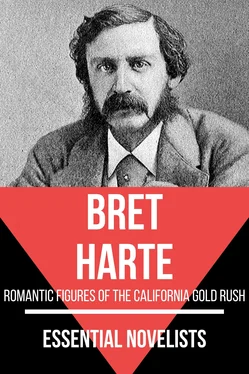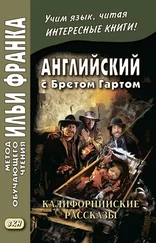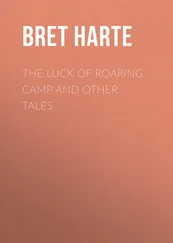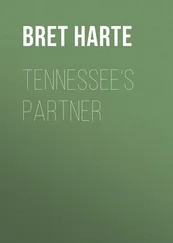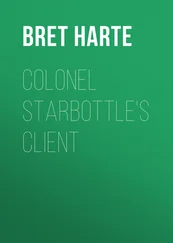It was evident that Arthur's manner had previously predisposed the old man in his favour. He held out two soft brown hands to the young man, addressed him with a pleasant smile as "My son," and welcomed him to the Mission.
"And why not this visit before?" asked Father Felipe, when they were seated upon the little verandah that overlooked the Mission garden, before their chocolate and cigaritos.
"I did not know I was coming until the day before yesterday. It seems that some new grants of the old ex-Governor's have been discovered, and that a patent is to be applied for. My partners being busy, I was deputed to come here and look up the matter. To tell the truth, I was glad of an excuse to see our fair client, or, at least, be disappointed, as my partners have been, in obtaining a glimpse of the mysterious Donna Dolores."
"Ah, my dear Don Arturo," said the Padre, with a slightly deprecatory movement of his brown hands, "I fear you will be no more fortunate than others. It is a penitential week with the poor child, and at such times she refuses to see any one, even on business. Believe me, my dear boy, you, like the others—more than the others—permit your imagination to run away with your judgment. Donna Dolores' concealment of her face is not to heighten or tempt the masculine curiosity, but alas!—poor child—is only to hide the heathenish tattooings that deface her cheek. You know she is a half-breed. Believe me, you are all wrong. It is foolish, perhaps—vanity—who knows? but she is a woman—what would you?" continued the sagacious Padre, emphasising the substantive with a slight shrug worthy of his patron saint.
"But they say, for all that, she is very beautiful," continued Arthur, with that mischievousness which was his habitual method of entertaining the earnestness of others, and which he could not entirely forego, even with the Padre.
"So! so! Don Arturo—it is idle gossip!" said Father Felipe, impatiently,—"a brown Indian girl with a cheek as tawny as the summer fields."
Arthur made a grimace that might have been either of assent or deprecation.
"Well, I suppose this means that I am to look over the papers with you alone. Bueno! Have them out, and let us get over this business as soon as possible."
"Poco tiempo," said Father Felipe, with a smile. Then more gravely, "But what is this? You do not seem to have that interest in your profession that one might expect of the rising young advocate—the junior partner of the great firm you represent. Your heart is not in your work—eh?"
Arthur laughed.
"Why not? It is as good as any."
"But to right the oppressed? To do justice to the unjustly accused, eh? To redress wrongs—ah, my son! that is noble. That, Don Arturo—it is that has made you and your colleagues dear to me—dear to those who have been the helpless victims of your courts—your corregidores."
"Yes, yes," interrupted Arthur, hastily, shedding the Father's praise with an habitual deft ease that was not so much the result of modesty as a certain conscious pride that resented any imperfect tribute. "Yes, I suppose it pays as well, if not better, in the long run. 'Honesty is the best policy,' as our earliest philosophers say."
"Pardon?" queried the Padre.
Arthur, intensely amused, made a purposely severe and literal translation of Franklin's famous apothegm, and then watched Father Felipe raise his eyes and hands to the ceiling in pious protest and mute consternation.
"And these are your American ethics?" he said at last.
"They are, and in conjunction with manifest destiny, and the star of Empire, they have brought us here, and—have given me the honour of your acquaintance," said Arthur in English.
Father Felipe looked at his friend in hopeless bewilderment. Arthur instantly became respectful and Spanish. To change the subject and relieve the old man's evident embarrassment, he at once plunged into a humorous description of his adventure of the morning. The diversion was only partially successful. Father Felipe became at once interested, but did not laugh. When the young man had concluded he approached him, and laying his soft hand on Arthur's curls, turned his face upward toward him with a parental gesture that was at once habitual and professional, and said—
"Look at me here. I am an old man, Don Arturo. Pardon me if I think I have some advice to give you that may be worthy your hearing. Listen, then! You are one of those men capable of peculiarly affecting and being affected by women. So! Pardon," he continued, gently, as a slight flush rose into Arthur's cheek, despite the smile that came as quickly to his face. "Is it not so? Be not ashamed, Don Arturo! It is not here," he added, with a poetical gesture toward the wall of the refectory, where hung the painted effigy of the blessed St Anthony; "it is not here that I would undervalue or speak lightly of their influence. The widow is rich, eh?—handsome, eh? impulsive? You have no heart in the profession you have chosen. What then? You have some in the instincts—what shall I say—the accomplishments and graces you have not considered worthy of a practical end! You are a natural lover. Pardon! You have the four S's—'Sáno, solo, solicito, y secreto.' Good! Take an old man's advice, and make good use of them. Turn your weaknesses—eh? perhaps it is too strong a word!—the frivolities and vanities of your youth into a power for your old age! Eh?"
Arthur smiled a superior smile. He was thinking of the horror with which the old man had received the axiom he had recently quoted. He threw himself back in his chair in an attitude of burlesque sentiment, and said, with simulated heroics—
"But what, O my Father! what if a devoted, exhausting passion for somebody else already filled my heart? You would not advise me to be false to that? Perish the thought!"
Father Felipe did not smile. A peculiar expression passed over his broad, brown, smoothly shaven face, and the habitual look of childlike simplicity and deferential courtesy faded from it. He turned his small black eyes on Arthur, and said—
"Do you think you are capable of such a passion, my son? Have you had an attachment that was superior to novelty or self-interest?"
Arthur rose a little stiffly.
"As we are talking of one of my clients and one of your parishioners, are we not getting a little too serious, Father? At all events, save me from assuming a bashful attitude towards the lady with whom I am to have a business interview to-morrow. And now about the papers, Father," continued Arthur, recovering his former ease. "I suppose the invisible fair one has supplied you with all the necessary documents and the fullest material for a brief. Go on. I am all attention."
"You are wrong again, son," said Father Felipe. "It is a matter in which she has shown even more than her usual disinclination to talk. I believe but for my interference, she would have even refused to press the claim. As it is, I imagine she wishes to make some compromise with the thief—pardon me!—the what do you say? eh? the pre-emptor! But I have nothing to do with it. All the papers, all the facts are in the possession of your friend, Mrs. Sepulvida. You are to see her. Believe me, my friend, if you have been disappointed in not finding your Indian client, you will have a charming substitute—and one of your own race and colour—in the Donna Maria. Forget, if you can, what I have said—but you will not. Ah, Don Arturo! I know you better than yourself! Come. Let us walk in the garden. You have not seen the vines. I have a new variety of grape since you were here before."
"I find nothing better than the old Mission grape, Father," said Arthur, as they passed down the branching avenue of olives.
"Ah! Yet the aborigines knew it not and only valued it when found wild for the colouring matter contained in its skin. From this, with some mordant that still remains a secret with them, they made a dye to stain their bodies and heighten their copper hue. You are not listening, Don Arturo, yet it should interest you, for it is the colour of your mysterious client, the Donna Dolores."
Читать дальше
